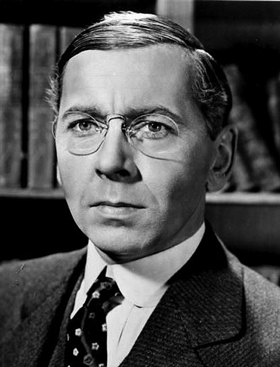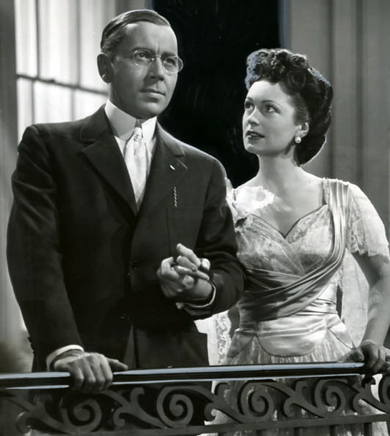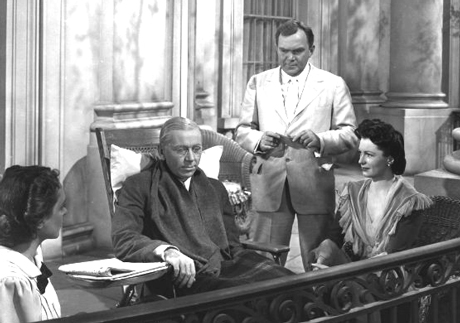
 |
|
|
|
Real golden-era movie moguls not only ran studios, they exercised the right to produce what they wanted, taking chances on filmmakers they believed in and championing or destroying careers as they saw fit. A boss like Harry Cohn was said to have no particular cinematic aspirations, but Louis B. Mayer and Jack Warner routinely imposed their personal taste and politics on the studio product. Perhaps envious of the stars and producers working under them, they occasionally indulged personal pet projects, perhaps with an eye to their legacy. 
Over at 20th Fox, Darryl F. Zanuck was known for pushing politically progressive fare like The Grapes of Wrath and The Ox-Bow Incident. He also had a good record for sheltering writers and at least one director (Jules Dassin) threatened by the blacklist. In the middle of WW2 Zanuck assembled an enormous personal Technicolor production that went against all the rules of commercial filmmaking. The lengthy film had no big stars or hot romantic angle for the advertising. It was about a political career of a President whose name even in 1944 was no longer a household word. This Democrat was, a college president, an intellectual and most tellingly, a visionary idealist. That's one quality that Americans supposedly admire but rarely cast their ballots for. In the midst of one World War, Darryl Zanuck's Wilson celebrates greatness and tragedy with a look back at the War to End All Wars, to find a man with a noble idea, stymied by political realities. Wilson was a dismal flop when new and has been a punching bag for critics ever since. Considered by Andrew Sarris to be "a muffed liberal opportunity", it actually reveals the unfair advantage enjoyed by stories about men of action, over those about men of conscience. Young audiences had little interest in a hero who looked like their high school principal, only stuffier -- when C.B. DeMille made a wartime movie about an older doctor in a war zone, he cast Gary Cooper in the role. If anything, Zanuck's Folly plays much better in the cynical present than it ever could then. Think, if you will, of the caliber of men competing for high office these days. The idea of a statesman as qualified, ethical and noble as Woodrow Wilson ever getting near the Presidency, or even wanting to, brings tears of gratitude: is such a thing still possible? Wilson wasn't exactly a candidate for perennial theatrical re-issues, as Zanuck reportedly forbid it to even be spoken of at Fox. Cut up by commercials on television airings it seemed impossibly slow. Taken in all at once, it plays quite well. In 1911, Princeton University president Woodrow Wilson (Canadian actor Alexander Knox) runs for the governorship of New Jersey, to the delight of his wife Ellen (Ruth Nelson) and his three daughters Margaret, Jessie and Eleanor (Madeleine Forbes, Ruth Ford, Mary Anderson). Wilson makes news by breaking with his political bosses, and in 1912 becomes an unlikely Presidential candidate. In his first term Wilson passes landmark reform legislation but makes a firm enemy of his Republican opponent Henry Cabot Lodge (Cedric Hardwicke). Ellen dies of a kidney disease, and Wilson remarries Edith Galt (Geraldine Fitzgerald) in the midst of vicious and unfounded gossip scandals. When Europe enters WW1 Wilson elects to stay out of the conflict, and wins reelection on this stand. The Republicans and business interests demand that Wilson retaliate against the sinking of the Lusitania, but he instead gets the Kaiser to renounce submarine warfare on neutral shipping. In his second term the Germans renege on their promise, and plot to bring Mexico into the war on their side. Wilson reverses course and America commits to the European war. After the armistice, Wilson's "Fourteen Points" for an equitable peace helped form the basis for a collective European agreement toward mutual security and disarmament -- the League of Nations. But on his return to Washington, he finds that he lacks the political clout to get Congress to ratify League membership for the United States. 
Wilson is by and large a fair picture of presidential politics in a colorful age. The film's Woodrow Wilson is that rare statesman that radiates wisdom and ethics; seasoned politicos feel humbled by his oratory. He holds to his principles and changes course only when forced to by outside influences. He doesn't over-govern and he leaves the details of fighting wars to the professional soldiers. But he's also not the kind of politician to compromise with entrenched interests. American business resents his policy's denial of profits from the war, and his political opposition is quick to exploit any weakness. It's entirely likely that the League of Nations is a pipe dream, that anybody taken in by the idea of all those selfish European powers cooperating with each other is a prize sucker. Yet Wilson gets points for dreaming the dream, and daring to try something even if it will probably fail. More realistic minds prevailed. Tellingly, the movie begins with the Princeton President consoling one of his athletes after losing a football game to Yale. Wilson is at all times an honorable man. One measure of the film's honesty is the fact that it doesn't invent a final scene in which Wilson's political enemies come to pay their respects or congratulate him on a struggle well fought. Henry Cabot Lodge and the other election victors instead give Wilson the cold fish treatment, and can't wait for him to exit the White House for good. Zanuck, Trotti and director Henry King, ably assisted by editor Barbara McLean, keep Wilson active and entertaining. Only intermittently do they reveal a mistrust of the material, as when the President and First Lady attend an Eddie Foy vaudeville show. The Wilson family previously didn't own a car, but the charming daughters don't go wild with the movie to Pennsylvania Avenue. They still gather around the piano to sing. Atop the enormous supporting cast are Thomas Mitchell as the President's secretary and Charles Coburn as a close family advisor. Mitchell brings some of the energy from his Frank Capra movies, without their overstated emotion. Considering the enormous quantity of exposition that must be delivered in the course of the movie, the dialogue is remarkably natural. I mention editor McLean because the film's storytelling style is superior to most 'historical' films of the time. There are no expressionist montages standing in for vast historical events; we instead visit recreations of gaudy political rallies. Good matte paintings abound, but there is no faking the large crowd scenes. Every character actor in Hollywood seems to be present to depict dozens of candidates, orators, advisors and pundits -- Sidney Blackmer, Vincent Price, Stanley Ridges and many more. Only once does the film resort to a montage of B&W footage, for some War Bond Rallies. The sinking of the Lusitania is depicted on the film's poster, but in the film we only hear verbal reports. This was actor Alexander Knox's first and perhaps only showcase starring role, and he's splendid as the somewhat stuffy but deeply soulful Wilson. He's a good physical match, too. The real-life First Ladies were a lot plumper than the actresses that play them; Geradine Fitzgerald as the second wife convinces us in record time that she's sincere and loving. The movie touches on an interesting episode when Wilson suffers a stroke -- his wife Edith becomes the acting President in his place. No mention is made of a Vice-President taking over, and there is no shameful scramble for the throne, as happened when President Reagan was wounded and hospitalized. 
I doubt that today's politicos are even aware of Wilson. It's probably better history than most Hollywood films, yet is still a movie for sentimental liberals looking for another potential Lincoln to admire. Want to trash Woodrow? Well, for a supposed isolationist he set a record for military intervention in Latin America, meddling in Haiti, the Dominican Republic, Mexico, Cuba, and Panama, at all times favoring hand-picked governments over popular rule. He also was a Southerner and a committed segregationist who held petty racist values in his private life and reportedly did what he could to deprive black civil servants of their jobs. The film shows none of this. It even has an embarrassing scene where one of Wilson's servants proudly says that his Mama did Woodrow's Mama's laundry. How could you, Zanuck? The 20th Century Fox Cinema Archives' DVD-R of Wilson plays well despite being an older transfer (the 1990s?) that exhibits occasional scanning errors. One four-minute section of the film did not play well in my viewing, lagging behind in updating the screen. I do not know if the disc or my player was at fault. Otherwise the picture is reasonably good, especially for a Technicolor production. The image is never completely sharp, but it is good enough to convey the spirit and vivacity of the images. I'm grateful to finally see it in (almost) one piece.
On a scale of Excellent, Good, Fair, and Poor,
Wilson Blu-ray rates:
Reviews on the Savant main site have additional credits information and are often updated and annotated with footnotes, reader input and graphics.
Review Staff | About DVD Talk | Newsletter Subscribe | Join DVD Talk Forum |
| ||||||||||||||||||